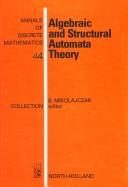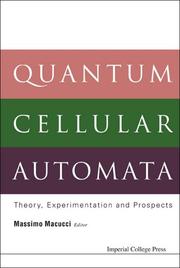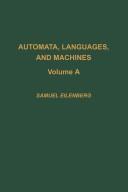| Listing 1 - 10 of 72 | << page >> |
Sort by
|

ISBN: 0444874585 9780444874580 9780080867847 0080867847 1281790702 9781281790705 9786611790707 6611790705 Year: 1991 Volume: 44 Publisher: Amsterdam New York North-Holland Pub. Co.
Abstract | Keywords | Export | Availability | Bookmark
 Loading...
Loading...Choose an application
- Reference Manager
- EndNote
- RefWorks (Direct export to RefWorks)
Automata Theory is part of computability theory which covers problems in computer systems, software, activity of nervous systems (neural networks), and processes of live organisms development.The result of over ten years of research, this book presents work in the following areas of Automata Theory: automata morphisms, time-varying automata, automata realizations and relationships between automata and semigroups.Aimed at those working in discrete mathematics and computer science, parts of the book are suitable for use in graduate courses in computer science, electronics, teleco
Discrete mathematics --- Sequential machine theory. --- Algebra. --- Sequential machine theory --- Mathematics --- Mathematical analysis --- Finite automata --- Finite state machines (Machine theory) --- Machine theory --- Electronic digital computers
Book
ISBN: 128352628X 9786613838735 0080957587 0444534032 9780080957586 Year: 2000 Publisher: Burlington : Elsevier Science,
Abstract | Keywords | Export | Availability | Bookmark
 Loading...
Loading...Choose an application
- Reference Manager
- EndNote
- RefWorks (Direct export to RefWorks)
Provability, Computability and Reflection

ISBN: 1281867209 9786611867201 1860949061 9781860949067 9781860946325 9781860949067 1860946321 9781281867209 6611867201 Year: 2006 Publisher: London Imperial College Press
Abstract | Keywords | Export | Availability | Bookmark
 Loading...
Loading...Choose an application
- Reference Manager
- EndNote
- RefWorks (Direct export to RefWorks)
"The Quantum Cellular Automaton (QCA) concept represents an attempt to break away from the traditional three-terminal device paradigm that has dominated digital computation. Since its early formulation in 1993 at Notre Dame University, the QCA idea has received significant attention and several physical implementations have been proposed. This book provides a comprehensive discussion of the simulation approaches and the experimental work that have been undertaken on the fabrication of devices capable of demonstrating the fundamentals of QCA action. Complementary views of future perspectives for QCA technology are presented, highlighting a process of realistic simulation and of targeted experiments that can be assumed as a model for the evaluation of future device proposals."
Cellular automata. --- Sequential machine theory. --- Finite automata --- Finite state machines (Machine theory) --- Machine theory --- Electronic digital computers --- Computers, Iterative circuit --- Iterative circuit computers --- Structures, Tessellation (Automata) --- Tessellation structures (Automata) --- Parallel processing (Electronic computers) --- Pattern recognition systems --- Sequential machine theory
Book
ISBN: 9535159984 9533071729 Year: 2011 Publisher: IntechOpen
Abstract | Keywords | Export | Availability | Bookmark
 Loading...
Loading...Choose an application
- Reference Manager
- EndNote
- RefWorks (Direct export to RefWorks)
Modelling and simulation are disciplines of major importance for science and engineering. There is no science without models, and simulation has nowadays become a very useful tool, sometimes unavoidable, for development of both science and engineering. The main attractive feature of cellular automata is that, in spite of their conceptual simplicity which allows an easiness of implementation for computer simulation, as a detailed and complete mathematical analysis in principle, they are able to exhibit a wide variety of amazingly complex behaviour. This feature of cellular automata has attracted the researchers' attention from a wide variety of divergent fields of the exact disciplines of science and engineering, but also of the social sciences, and sometimes beyond. The collective complex behaviour of numerous systems, which emerge from the interaction of a multitude of simple individuals, is being conveniently modelled and simulated with cellular automata for very different purposes. In this book, a number of innovative applications of cellular automata models in the fields of Quantum Computing, Materials Science, Cryptography and Coding, and Robotics and Image Processing are presented.
Cellular automata. --- Computers, Iterative circuit --- Iterative circuit computers --- Structures, Tessellation (Automata) --- Tessellation structures (Automata) --- Parallel processing (Electronic computers) --- Pattern recognition systems --- Sequential machine theory --- Computer architecture & logic design
Book
ISBN: 9535155199 9533072466 Year: 2011 Publisher: IntechOpen
Abstract | Keywords | Export | Availability | Bookmark
 Loading...
Loading...Choose an application
- Reference Manager
- EndNote
- RefWorks (Direct export to RefWorks)
Wireless cellular networks are an integral part of modern telecommunication systems. Today it is hard to imagine our life without the use of such networks. Nevertheless, the development, implementation and operation of these networks require engineers and scientists to address a number of interrelated problems. Among them are the problem of choosing the proper geometric shape and dimensions of cells based on geographical location, finding the optimal location of cell base station, selection the scheme dividing the total net bandwidth between its cells, organization of the handover of a call between cells, information security and network reliability, and many others. The book focuses on three types of problems from the above list - Positioning, Performance Analysis and Reliability. It contains three sections. The Section 1 is devoted to problems of Positioning and contains five chapters. The Section 2 contains eight Chapters which are devoted to quality of service (QoS) metrics analysis of wireless cellular networks. The Section 3 contains two Chapters and deal with reliability issues of wireless cellular networks. The book will be useful to researches in academia and industry and also to post-gradute students in telecommunication specialitiies.
Cellular automata. --- Computers, Iterative circuit --- Iterative circuit computers --- Structures, Tessellation (Automata) --- Tessellation structures (Automata) --- Parallel processing (Electronic computers) --- Pattern recognition systems --- Sequential machine theory --- WAP (wireless) technology
Book
ISBN: 1400875595 9781400875597 0691079145 0691626944 0691653100 9780691653105 Year: 2015 Publisher: Princeton, NJ
Abstract | Keywords | Export | Availability | Bookmark
 Loading...
Loading...Choose an application
- Reference Manager
- EndNote
- RefWorks (Direct export to RefWorks)
Numerical analysts and computer operators in all fields will welcome this publication in book form of Cecil Hastings' well-known approximations for digital computers, formerly issued in loose sheets and available only to a limited number of specialists. In a new method that combines judgment and intuition with mathematics, Mr. Hasting has evolved a set of approximations which far surpasses in simplicity earlier approximations developed by conventional methods. Part I of this book introduces the collection of useful and illustrative approximations, each of which is presented with a carefully drawn error curve in Part II.Originally published in 1955.The Princeton Legacy Library uses the latest print-on-demand technology to again make available previously out-of-print books from the distinguished backlist of Princeton University Press. These editions preserve the original texts of these important books while presenting them in durable paperback and hardcover editions. The goal of the Princeton Legacy Library is to vastly increase access to the rich scholarly heritage found in the thousands of books published by Princeton University Press since its founding in 1905.
Book
ISBN: 9781621001485 1621001482 9781617615924 1617615927 Year: 2011 Publisher: New York
Abstract | Keywords | Export | Availability | Bookmark
 Loading...
Loading...Choose an application
- Reference Manager
- EndNote
- RefWorks (Direct export to RefWorks)
Book
ISBN: 981190541X 9811905428 Year: 2022 Publisher: Singapore : Springer,
Abstract | Keywords | Export | Availability | Bookmark
 Loading...
Loading...Choose an application
- Reference Manager
- EndNote
- RefWorks (Direct export to RefWorks)

ISBN: 0122340019 9780122340017 0122340027 9786611763466 1281763462 0080873758 9786611763459 1281763454 008087374X 9780122340024 Year: 1974 Volume: 59 Publisher: New York Academic Press
Abstract | Keywords | Export | Availability | Bookmark
 Loading...
Loading...Choose an application
- Reference Manager
- EndNote
- RefWorks (Direct export to RefWorks)
Automata, languages, and machines
Computer science --- Sequential machine theory --- Formal languages --- Théorie des machines séquentielles --- Langages formels --- ELSEVIER-B EPUB-LIV-FT --- Formal languages. --- Sequential machine theory. --- Automata --- Machine theory. --- Abstract automata --- Abstract machines --- Mathematical machine theory --- Algorithms --- Logic, Symbolic and mathematical --- Recursive functions --- Robotics --- Finite automata --- Finite state machines (Machine theory) --- Machine theory --- Electronic digital computers --- 519.713 --- 519.713 Automata --- Automates abstraits --- Automates finis

ISBN: 1281763454 9786611763459 008087374X 0122340019 0122340027 Year: 1974 Publisher: New York : Academic Press,
Abstract | Keywords | Export | Availability | Bookmark
 Loading...
Loading...Choose an application
- Reference Manager
- EndNote
- RefWorks (Direct export to RefWorks)
Automata, languages, and machines
Sequential machine theory. --- Formal languages. --- Formalization (Linguistics) --- Language and languages --- Machine theory --- Finite automata --- Finite state machines (Machine theory) --- Electronic digital computers --- Sequential machine theory --- Formal languages --- Théorie des machines séquentielles --- Langages formels --- ELSEVIER-B EPUB-LIV-FT --- Automates abstraits --- Automates finis
| Listing 1 - 10 of 72 | << page >> |
Sort by
|

 Search
Search Feedback
Feedback About UniCat
About UniCat  Help
Help News
News